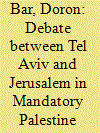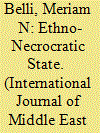| Srl | Item |
| 1 |
ID:
141609


|
|
|
|
|
| Summary/Abstract |
During the Mandate era a custom of re-interment of Jewish thinkers and leaders developed. These were mostly Zionists leaders and ideologists who passed away in the Diaspora and their remains were brought to be buried in Palestine. The article deals with the conflict between Tel Aviv and Jerusalem on the right to re-inter within their boundaries Zionist leaders such as Theodor Herzl, Max Nordau, Leo Motzkin and Yehuda Leib Pinsker. Although this phenomenon was universal, the Zionist case was unique and exceptional as most of the political Zionist activity took place outside of Palestine, mostly in Europe.
|
|
|
|
|
|
|
|
|
|
|
|
|
|
|
|
| 2 |
ID:
190218


|
|
|
|
|
| Summary/Abstract |
Using the unique and historic Islamic cemetery of Mamillah in Jerusalem as a primary example, this essay discusses the ethno-necrocratic order that led to the 2008 Israeli High Court of Justice's codification of the supremacy of Jewish bodies and afterlives over non-Jewish ones, on the basis of advancing Israel's values. Hundreds of Palestinian burial grounds, starting with village cemeteries, have been destroyed since 1948. Indeed, funerary sites have testified to the omnipresence and millenarian existence of a population that the state has sought to erase from memory. In a few decades, the deathscape was radically altered, in cities as in the countryside. Although real estate corruption plagues Israeli politics, land use planning and real estate capitalism are inseparable from the ethno-racial politics of exclusion, which affect both the dead and the living.
|
|
|
|
|
|
|
|
|
|
|
|
|
|
|
|
| 3 |
ID:
177274


|
|
|
|
|
| Summary/Abstract |
Between 1948 and1967, Muslim cemeteries in the State of Israel saw many changes. The present article examines how the state elected to treat the many deserted Muslim cemeteries within its limits: should these cemeteries be protected by the Jewish state? Or should they be demolished, their remains removed from the evolving Israeli landscape? Israeli archival sources facilitate the study of this phenomenon, highlighting the duplicitous nature of the Israeli bureaucratic approach toward Muslim cemeteries. Charged with safeguarding the sites, the Ministry of Religious Affairs’ Muslim and Druze Department attempted to confront the state’s propensity to evacuate the cemeteries and use the vacant space for different needs. Yet, at the same time, other Israeli actors – various governmental offices, municipalities, and even the army – played a part in the process of neglect, damage, and appropriation that these cemeteries suffered.
|
|
|
|
|
|
|
|
|
|
|
|
|
|
|
|